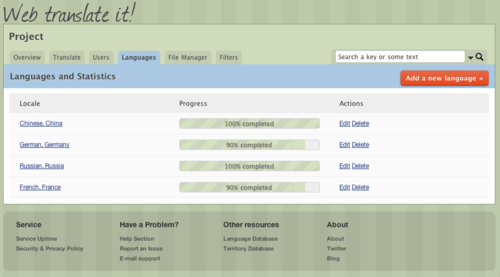Happy new year! Here are a bunch of improvements for 2010.
Statistics
This is not really a new feature, but rather a different way of calculating statistics. Instead of processing them on every page load and asking you to wait a few seconds until it loads, stats calculation is deferred and calculated in the background. This is the same system used for the language file importer/exporter and the search engine’s indexer.
Since you don’t have to wait for the stats calculations to finish, the pages load much faster. You will sometimes see a notice indicating the stats are not up to date.

Web Translate It will then bring the stats up to date and automatically display them when available. It usually takes less than two seconds.

The filters and the stats section on the top of the translation interface have been redesigned to be clearer and easier to use.
This improvement is the first part of an upcoming new feature: project reporting. With reporting, you will be able to get detailed stats about your project over time. This requires the ability to generate costly statistics without making the website slower.
On top of the statistics improvements, many other tweaks have been done to make the translation interface load faster.
Progress bars on language page
The language page now has a progress bar indicating the percentage of completed and translated strings for that project. Of course, it also use deferred calculations.

Better Markdown help
Comments on Web Translate It are formatted using Markdown, an easy to use markup language. The help section about Markdown was very poor. You now have a decent help page for helping you to write better comments.

I open-sourced it if you need this help page on your own project.
That’s it! I hope you will enjoy these improvements, thank you for using Web Translate It!








